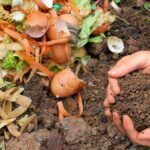Get out your gardening gloves — May 29 is National Learn About Composting Day! We all want to do our part to conserve natural resources and reduce our carbon footprint. Composting is not only an environmentally safe fertilizer but it can help you save water, energy, fuel, and money! It also keeps toxins from getting in our run-off and groundwater through the use of chemical- based commercial fertilizers. The use of a natural fertilizer made from compost will make your garden hospitable to wildlife helpers like honeybees, hummingbirds and of course, worms!
So, what it compost? Compost is organic matter that has decomposed. In a garden, decomposition is a good thing! Compost can be made from kitchen scraps, lawn clippings, newspapers, leaves wood chips, coffee grinds — almost any food products except for processed foods (no Twinkies in the compost!) and meat or fish products. Composting saves resources, and because of its high nutrient content, it adds to soil stability and reduces soil disease. It will help your garden grow lush and promote healthy growth in seedlings and plants. It’s for all these reasons gardeners call compost “black gold”. Composting allows you to accomplish the big environmental three: Reduce, Reuse and Recycle.
Learn About Composting Day timeline
Even though the method of composting is around, it won’t be written about for another 10,000 years.
Founding Father George Washington is well-known as ‘America’s First Composter.’
According to the book “The Practical Farmer” by John Spurrier, Washington instructed his farm workers to, “Rake, and scrape up all the trash, of every sort and kind about the houses … and throw it … into the Stercorary.”
Composting goes large-scale when Connecticut-based Stephen Hoyt famously composts over 200,000 fish and 17,500 bushels of manure in a single season.
How to Observe Learn About Composting Day
Visit a farmers market
Speak with local farmers and gardeners about composting and their growing practices. Composting is one of the foundations of sustainable farming and you will find growers, particularly those who sell organic produce, are quite knowledgeable about compost. Then wander the farmers market and take in the colorful bounty of produce, the smell of fresh produce, flowers, and baked goods, and score yourself some delicious and healthy food.
Make your own compost
Compost is ideally made with a mix that is two-thirds carbon-based (that’s your organic kitchen scraps) and one-third nitrogen-based (newspapers, cardboard, wood shavings). All you need to do is pick a section of the yard, lay down a foundation of twigs, and begin to layer your materials. If you cover it with a tarp it will help increase the heat to aid in decomposition. Once a week or so, use a shovel to mix up your compost pile and if it’s very dry, be sure to add some water as it should be kept damp. You can use this simple no-cost method, or invest in one of many compost bins to speed the process along.
Introduce a child to composting
Get your child excited about contributing to the conservation of natural resources through composting! First make them a snack of “worms in dirt." In a clear glass put some chocolate pudding. Next put crushed chocolate wafers on top to form the “dirt” and finally, poke some gummy worms in to the mixture. Then tell your child you need help saving the planet. Explain about creating a compost pile and show them where they will need to throw out potato peels, egg shells, dry leaves, etc. As soon as your child sees the process at work (and don’t forget the worms!), you’ll have hooked them and will have created a lifelong conservationist.
Why Learn About Composting Day is Important
It’s free
Starting your own compost pile will cost you nothing but a little effort, space, and time. Figure out the method you’d like to use to compost, and take items you may have thrown out or recycled and use them to create your compost pile! Once you’ve got the right mix of items, you only need to keep it slightly damp and turn it every once in a while and the process of decomposition will do all the work for you! Be patient and in few short weeks you can have your own black gold made from your household garbage. This is definitely a case of turning trash into treasure.
It’s environmentally friendly
By utilizing your household organic and paper trash, you reduce the amount of garbage going to our landfill. When organic waste is put in the trashcan, the trash is driven to a disposal site where it can take years to decompose because it’s been encased in a plastic bag. Using compost in your garden or on a farm also reduces the amount of dangerous commercial fertilizers used to encourage growth in crops, and conserves water by improving the stability of the soil in which you’ve planted your fruits, vegetables, flowers, and shrubbery.
It’s fun
There is a feeling of total satisfaction when you take something that could have been put in the garbage and transform it into a usable substance. It’s almost like magic! Also the use of compost will increase the worm population and if you have children, you know worms are, in fact, fun to watch and have wiggle in your palm! You know the worms are doing the work of aerating the soil and increasing nutrients in the dirt, but your kids just think worms are cool.
Learn About Composting Day dates
| Year | Date | Day |
|---|---|---|
| 2026 | May 29 | Friday |
| 2027 | May 29 | Saturday |
| 2028 | May 29 | Monday |
| 2029 | May 29 | Tuesday |
| 2030 | May 29 | Wednesday |


















